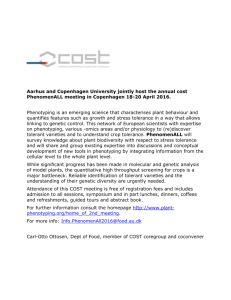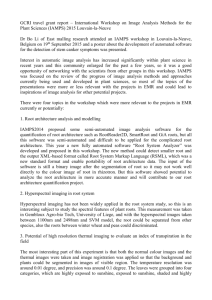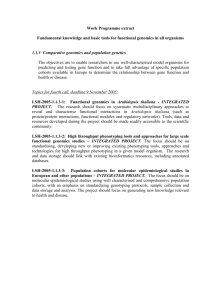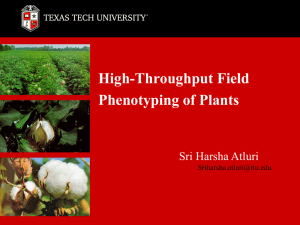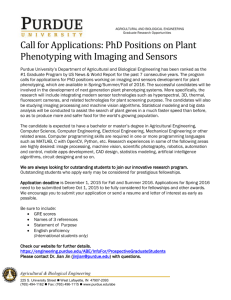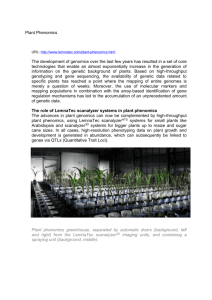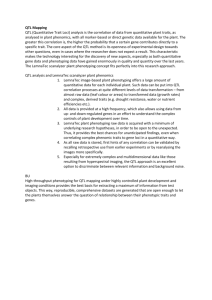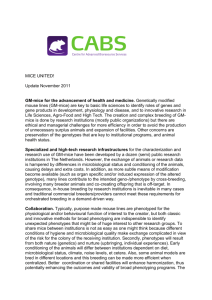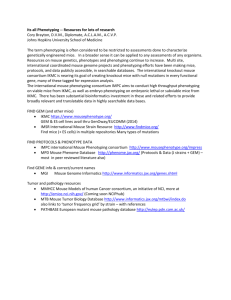Program Overview
advertisement
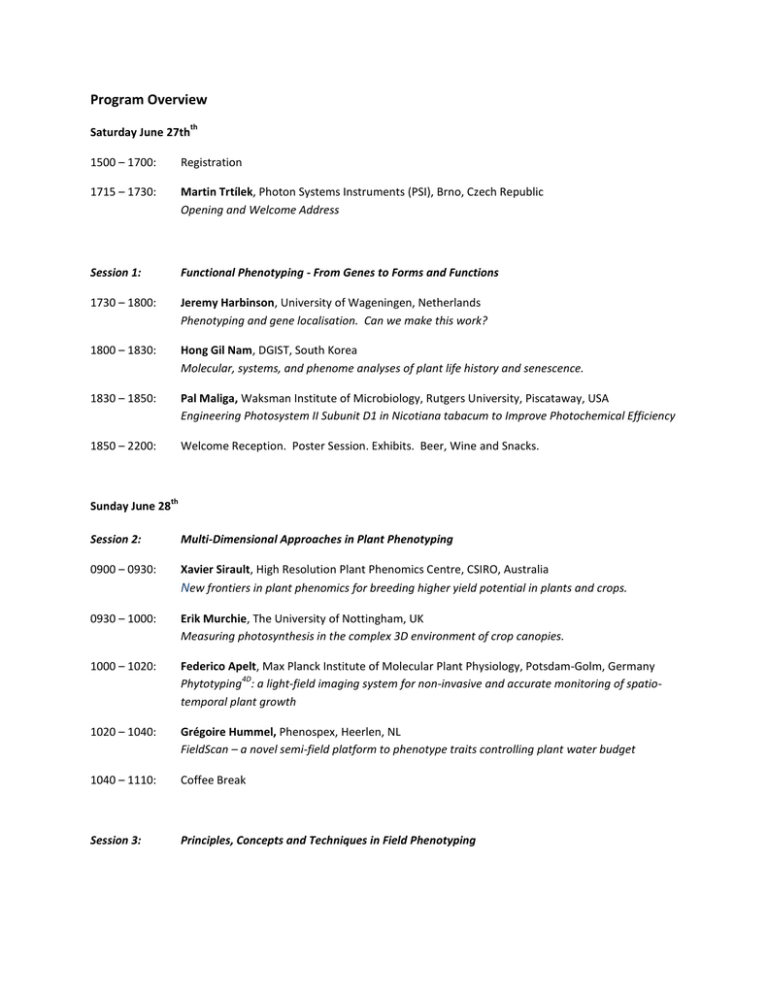
Program Overview Saturday June 27th th 1500 – 1700: Registration 1715 – 1730: Martin Trtílek, Photon Systems Instruments (PSI), Brno, Czech Republic Opening and Welcome Address Session 1: Functional Phenotyping - From Genes to Forms and Functions 1730 – 1800: Jeremy Harbinson, University of Wageningen, Netherlands Phenotyping and gene localisation. Can we make this work? 1800 – 1830: Hong Gil Nam, DGIST, South Korea Molecular, systems, and phenome analyses of plant life history and senescence. 1830 – 1850: Pal Maliga, Waksman Institute of Microbiology, Rutgers University, Piscataway, USA Engineering Photosystem II Subunit D1 in Nicotiana tabacum to Improve Photochemical Efficiency 1850 – 2200: Welcome Reception. Poster Session. Exhibits. Beer, Wine and Snacks. Sunday June 28 th Session 2: Multi-Dimensional Approaches in Plant Phenotyping 0900 – 0930: Xavier Sirault, High Resolution Plant Phenomics Centre, CSIRO, Australia New frontiers in plant phenomics for breeding higher yield potential in plants and crops. 0930 – 1000: Erik Murchie, The University of Nottingham, UK Measuring photosynthesis in the complex 3D environment of crop canopies. 1000 – 1020: Federico Apelt, Max Planck Institute of Molecular Plant Physiology, Potsdam-Golm, Germany 4D Phytotyping : a light-field imaging system for non-invasive and accurate monitoring of spatiotemporal plant growth 1020 – 1040: Grégoire Hummel, Phenospex, Heerlen, NL FieldScan – a novel semi-field platform to phenotype traits controlling plant water budget 1040 – 1110: Coffee Break Session 3: Principles, Concepts and Techniques in Field Phenotyping 1110 – 1140: Uwe Rascher, Forschungszentrum Jülich, Germany Quantitative Plant Phenotyping from the Gene to the Field: Scientific challenges beyond sensors and higher throughput. 1140 – 1210: Antoine Harfouche, University of Tuscia, Italy Field-based Phenomics: Toward More Efficient Forest Tree Breeding. 1210 – 1240 Tracy Valentine, The James Hutton Institute, Dundee Tools and techniques for phenotyping plant - soil interactions and root phenotyping. 1240 – 1300 Alexandra J. Burgess, University of Nottingham, Plant and Crop Sciences, Nottingham, UK Exploring canopy architecture and the light environment using digital 3D reconstruction and ray tracing 1300 – 1400: Lunch Session 4: Phenomics Data – Sensors, Interpretations and Handling 1400 – 1430: Alan Gay, Aberystwyth University, UK A review of practicalities of hyperspectral imaging in plant science with some case studies 1430 – 1500: Kristiina Himanen, University of Helsinki, Finland The Finnish Plant Phenotyping Infrastructure –the road to high throughput and high precision. 1500 – 1530: Stanislaw Karpinski, Warsaw University of Life Sciences, Warsaw, Poland What can we learn from regulation of the absorbed photon fate. 1530 – 1550: Ivan Simko, United States Department of Agriculture, Washington, D.C., USA Application of chlorophyll fluorescence imaging and hyperspectral imaging in evaluation of decay in fresh-cut lettuce. 1550 – 1630: Coffee Break Session 5: Breeding for Stress Tolerance in Plants 1630 – 1700: Karel Klém, Czech Globe, Department of impact experiments, Brno, Czech Republic Optical methods for biotic and abiotic stress analysis in plants 1700 – 1730: Lukáš Spíchal, Department of Chemical Biology and Genetics, Centre of the Region Haná for Biotechnological and Agricultural Research, Palacký University in Olomouc Use of high-throughput phenotyping in development of plant growth regulators. 1730 – 1750: Kannan Chinnathambi, The University of Nottingham, UK Exploiting Wheat Alien Introgressions for Increased Photosynthetic Productivity in Contrasting Environmental Conditions. 1750 – 1810: Sooyeon Ko, Guangxi Wu, Pusan National University, South Korea The consequences of lacking PsbS protein of Photosystem II in rice plants. 1810 – 1830: Christiaan Biemond, Keygene, The Netherlands Next generation digital phenotyping to support breeding. 1830 – 2200: Poster Session. Exhibits. Barbecue, beer ,wine and music. Monday June 29 th Session 6: Phenomics in Algal Biotechnology 0900 – 0930: Himadri Pakrasi, Washington University in St. Louis, USA High Throughput Phenotyping for Systems Level Analysis of Cyanobacterial Physiology and Productivity. 0930 – 1000: Richard Sayre, Los Alamos National Laboratories, USA Engineering plants and algae for improved photosynthetic performance. 1000 – 1020: Jan Červený, Czech Globe, Laboratory of Adaptation Biotechnologies, Brno, Czech Republic TBA 1020 – 1040: Ulrich M. Tillich, Humboldt University Berlin, Berlin, Germany PhotoScreener: A high-throughput cultivation and screening platform for unicellular phototrophs 1040 – 1110: Coffee Break Session 7: General Session and Introduction to Workshop Topics 1110 – 1130: José Correa, INIA La Platina, Santiago, Chile Phenotyping and Identification of QTLs and Genes Underlying Complex Traits in Table Grapes (Vitis vinifera L.) 1130 – 1150: Utama Ditdit Nugeraha, University of Göttingen, Germany. A structural model of the rice plant for optimizing the light interception capability. 1150 – 1210: Steve Hunt, Queens University, Department of Biology, Kingston Ontario, Canada. Introduction to workshop topics. 1210 – 1310: Lunch 1330 – 1630: Departure. Delegates transported by bus from Prague to the hotel Vista in Brno. 1800 : Departure from hotel Vista to Mendel´s Museum 1830 – 1930: Guided visit of Mendel´s Museum in Brno 1930 – Late: Conference dinner Tuesday June 30 th 0830 – 0900: Delegates transported by bus from hotel Vista in Brno to PSI Plant Phenotyping Centre in Drasov 0900 – 0930: Welcome address and division of delegates into workshop groups. 0930 – 1100: Rotating Workshops Session 1 1100 – 1230: Rotating Workshops Session 2 1230 – 1300: Lunch 1330 – 1500: Rotating Workshops Session 3 1500 – 1630: Rotating Workshops Session 4 1630 – 1645: Final word – End of the IPAP2015 Symposium 1645 – 1900: Delegates transported by bus from PSI Plant Phenotyping Centre to Prague. Wednesday July 1 st Optional extension of the practical workshop at PSI Plant Phenotyping Centre in Drasov. For more information please contact us machatova@psi.cz
